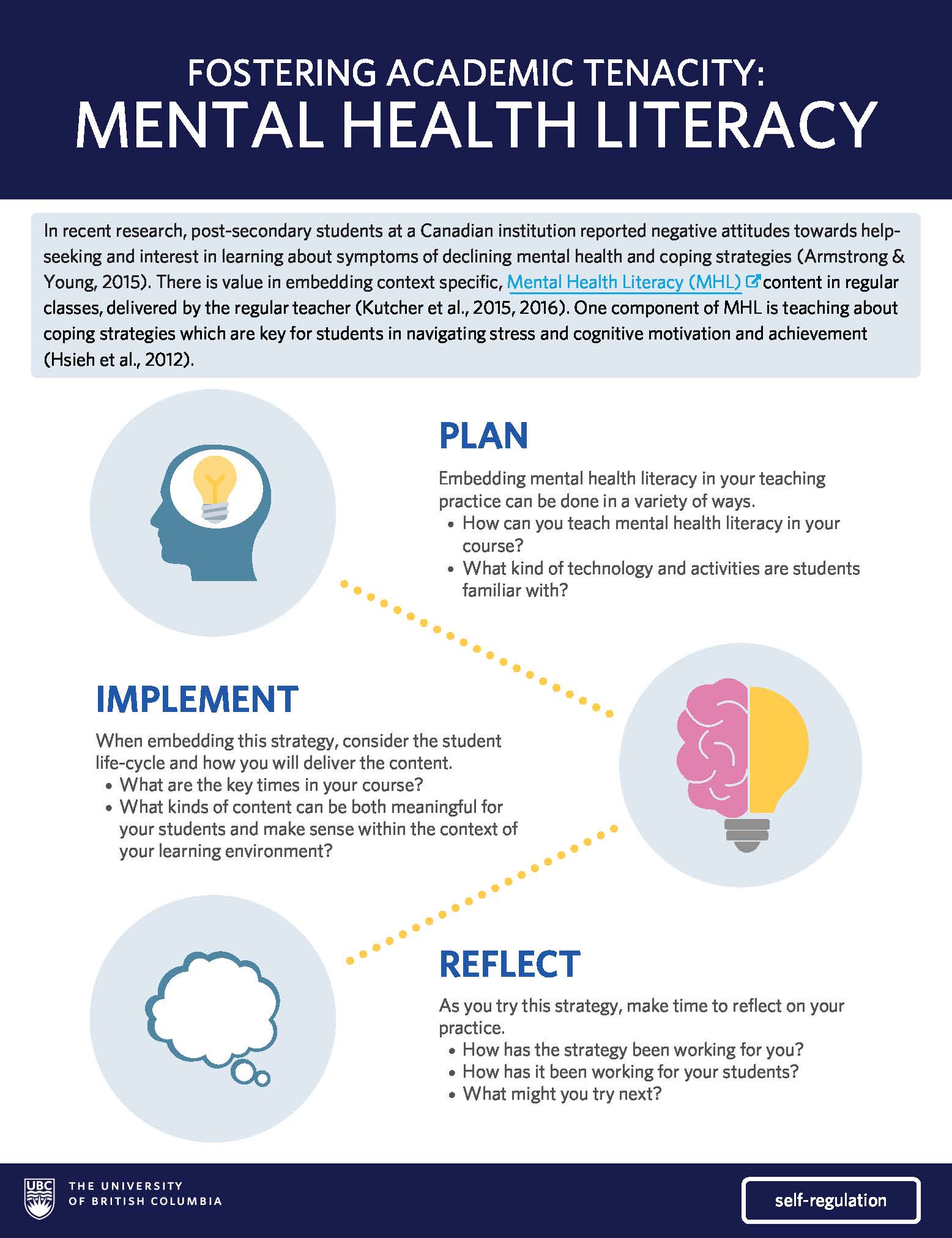Enhancing Mental Health Literacy: Educational Programs And Resources

Table of Contents
Understanding Mental Health Literacy
Defining Mental Health Literacy
Mental health literacy encompasses a broad range of knowledge and skills. It involves recognizing the symptoms of various mental health conditions, understanding their potential causes and risk factors, and knowing where to access appropriate treatments and support. This crucial literacy also includes recognizing the importance of early intervention and challenging the stigma that often prevents individuals from seeking help.
- Examples of mental health conditions: Depression, anxiety disorders (generalized anxiety disorder, panic disorder, social anxiety disorder), post-traumatic stress disorder (PTSD), bipolar disorder, schizophrenia, and eating disorders.
- Importance of early intervention: Early identification and treatment of mental health conditions significantly improves outcomes and reduces the long-term impact on individuals and their families.
- Understanding the stigma surrounding mental illness: Stigma creates barriers to help-seeking and can worsen the experience of mental health challenges.
The Importance of Mental Health Literacy
Improved mental health literacy benefits individuals, families, and communities alike. It fosters a more supportive and understanding environment, leading to better mental health outcomes for everyone.
- Reduced stigma: Increased knowledge and awareness help to dismantle harmful stereotypes and prejudices surrounding mental illness.
- Improved help-seeking behavior: Individuals with better mental health literacy are more likely to recognize symptoms, seek professional help, and adhere to treatment plans.
- Better self-management of conditions: Understanding one's condition and available coping mechanisms empowers individuals to manage their mental health effectively.
- Stronger support networks: Mental health literacy strengthens family and community support systems, enabling better understanding and more effective support for those struggling with mental health challenges.
Educational Programs for Enhancing Mental Health Literacy
School-Based Programs
Integrating mental health education into school curricula is vital for building early awareness and fostering positive attitudes towards mental well-being. Age-appropriate programs can equip students with the knowledge and skills they need to navigate challenges and support their peers.
- Examples of successful school programs: Many schools are implementing evidence-based programs focusing on stress management, emotional regulation, and social skills development.
- Integration with existing health curricula: Mental health education can be seamlessly integrated into existing health and life skills classes.
- Teacher training resources: Providing teachers with the necessary training and resources is crucial for the effective delivery of mental health education.
Workplace Wellness Programs
Employers are increasingly recognizing the importance of promoting mental well-being in the workplace. Mental health literacy training can reduce workplace stress, increase productivity, and create a more supportive work environment.
- Stress management techniques: Workshops and resources on stress management, mindfulness, and work-life balance are highly beneficial.
- Mental health awareness campaigns: Raising awareness through campaigns and internal communications helps to normalize conversations about mental health.
- Employee assistance programs (EAPs): EAPs provide confidential counseling and support services to employees.
Community-Based Initiatives
Community-based programs play a crucial role in reaching diverse populations and promoting mental health literacy across the broader community.
- Workshops and seminars: Offering workshops and seminars on various mental health topics can provide valuable information and support.
- Public awareness campaigns: Public awareness campaigns using various media channels help increase understanding and reduce stigma.
- Support groups: Support groups provide a safe and supportive environment for individuals to connect with others facing similar challenges.
- Collaborations with community organizations: Partnerships between mental health organizations and community groups expand reach and impact.
Online Resources for Improving Mental Health Literacy
Websites and Apps
The internet provides a wealth of information and support for improving mental health literacy. However, it's essential to identify trustworthy and reliable sources.
- Examples of reputable organizations: The National Institute of Mental Health (NIMH), MentalHealth.gov, and the National Alliance on Mental Illness (NAMI) offer credible information and resources.
- Features of helpful apps: Many mental health apps offer self-assessment tools, coping mechanisms, and access to mental health professionals.
Social Media and Online Communities
Social media can be a powerful tool for disseminating information and building support networks, but it also presents challenges.
- Identifying credible sources: It's important to be critical of information found online and to rely on trustworthy sources.
- Responsible social media use: Engage in respectful and supportive conversations, and avoid spreading misinformation or stigmatizing language.
- Navigating online support groups: Online support groups can provide valuable peer support, but it's important to be mindful of potential risks and to seek professional help when needed.
Overcoming Barriers to Enhancing Mental Health Literacy
Addressing Stigma
Reducing the stigma surrounding mental illness is critical for improving mental health literacy.
- Public awareness campaigns: Campaigns can challenge negative stereotypes and promote understanding and empathy.
- Promoting empathy and understanding: Encouraging open conversations and sharing personal stories can help to destigmatize mental health challenges.
- Challenging negative stereotypes: Actively challenging negative stereotypes in media and everyday conversations is essential.
Ensuring Accessibility
Ensuring that mental health resources are accessible to everyone regardless of their background or circumstances is crucial.
- Multilingual resources: Providing information in multiple languages ensures that resources are accessible to diverse communities.
- Affordable or free programs: Making programs and resources affordable or free removes financial barriers to access.
- Rural outreach initiatives: Reaching individuals in rural and underserved areas requires targeted outreach programs.
Conclusion
Enhancing mental health literacy is essential for improving individual well-being and building stronger, more supportive communities. By implementing effective educational programs and utilizing available resources, we can reduce stigma, promote help-seeking behavior, and improve mental health outcomes. To build your mental health literacy, explore the resources mentioned in this article, including reputable websites like NIMH and NAMI. Participate in local awareness events, and encourage open conversations about mental health within your family, workplace, and community. Take the first step towards improving your understanding of mental health and become more mentally healthy.

Featured Posts
-
 Macau Casino Revenue Positive Surprise Ahead Of Golden Week
May 02, 2025
Macau Casino Revenue Positive Surprise Ahead Of Golden Week
May 02, 2025 -
 How To Get Wwe Skins In Fortnite Cody Rhodes And The Undertaker
May 02, 2025
How To Get Wwe Skins In Fortnite Cody Rhodes And The Undertaker
May 02, 2025 -
 Juridische Strijd Nieuw Duurzaam Schoolgebouw Kampen Kan Niet Op Stroomnet Worden Aangesloten
May 02, 2025
Juridische Strijd Nieuw Duurzaam Schoolgebouw Kampen Kan Niet Op Stroomnet Worden Aangesloten
May 02, 2025 -
 Latest Lotto Results Winning Numbers For Lotto Lotto Plus 1 And Lotto Plus 2
May 02, 2025
Latest Lotto Results Winning Numbers For Lotto Lotto Plus 1 And Lotto Plus 2
May 02, 2025 -
 Dash Rendar Joins Hasbros Star Wars Collection Shadow Of The Empire Figure Revealed
May 02, 2025
Dash Rendar Joins Hasbros Star Wars Collection Shadow Of The Empire Figure Revealed
May 02, 2025
Latest Posts
-
 Solve Nyt Strands Game 354 Thursday February 20 Hints And Answers
May 10, 2025
Solve Nyt Strands Game 354 Thursday February 20 Hints And Answers
May 10, 2025 -
 Jeanine Pirro From Fox News To Potential Dc Prosecutor Under Trump
May 10, 2025
Jeanine Pirro From Fox News To Potential Dc Prosecutor Under Trump
May 10, 2025 -
 Fox News Hosts Sharp Rebuttal To Colleagues Trump Tariff Comments
May 10, 2025
Fox News Hosts Sharp Rebuttal To Colleagues Trump Tariff Comments
May 10, 2025 -
 Fox News Jeanine Pirro Trumps New D C Prosecutor
May 10, 2025
Fox News Jeanine Pirro Trumps New D C Prosecutor
May 10, 2025 -
 Jeanine Pirro Exploring Her Background Achievements And Net Worth
May 10, 2025
Jeanine Pirro Exploring Her Background Achievements And Net Worth
May 10, 2025
